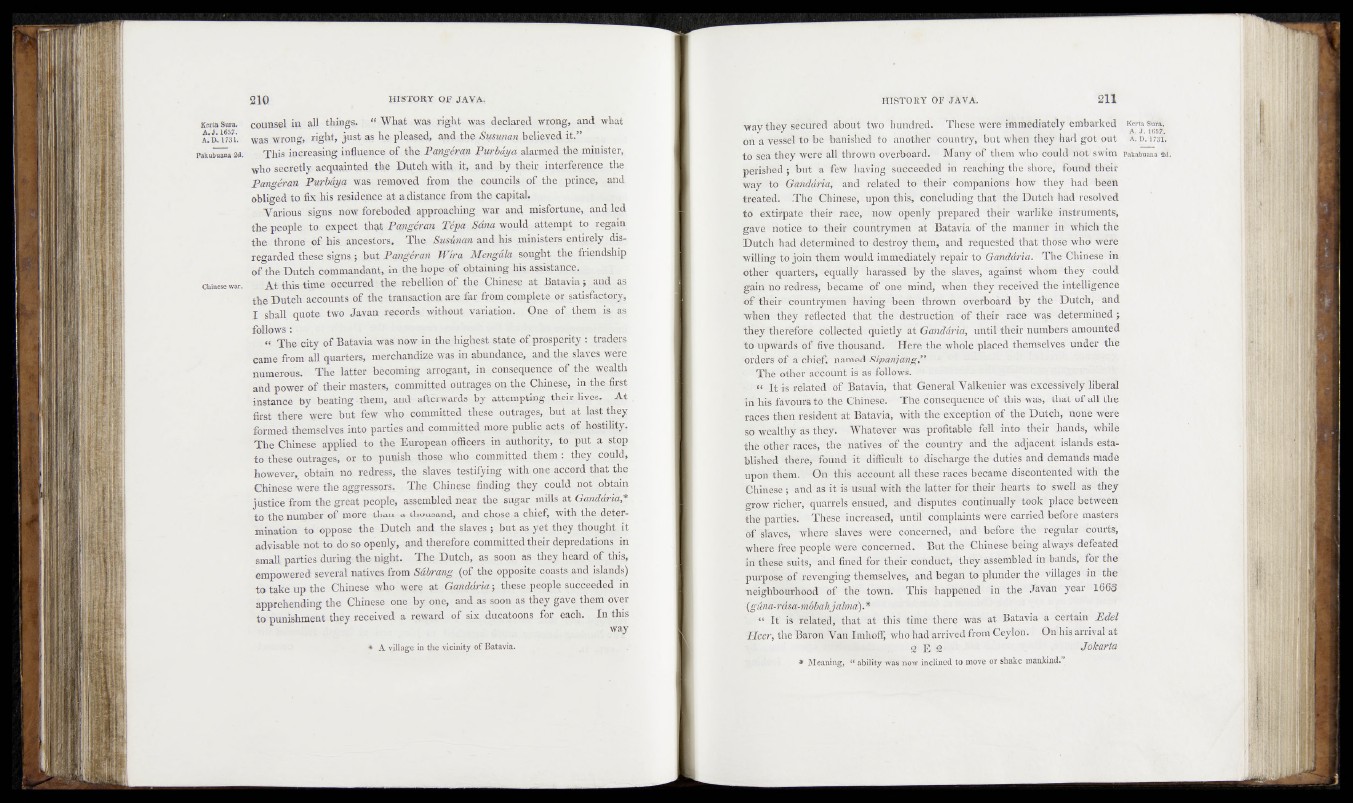
Kärta Sura.
A. J. 1657.
A. B. 1731.
Pakubuana 2d.
Chinese war.
counsel in all things. § Whfct was tight was declared wrong, and what
was wrong, right) just a? he pleased, and thp Susunan believed it.” -
This increasing infiu§nc$of the. Pangémn Bwebaya alarmed the minister,
who secretly acquainted, the Pqtch with, it, and hy their interference the
jPangéran Purbdya was removed from, the councils of the prince, and
obliged to fix bis residence at a distance from the capital.
Various signs now foreboded approaching war and, misfortune, and led
the people to, expect that Pqngérai$ Tépa Sdna would attempt to regain
the throne óf his. .ancestors. The Susunan and lfis ministers en%'ely. disregarded
these signs.; hut Pangêran Wira Mengala sought the friendship
of the Dutch commandant* in the hop© qf obtaining!^ assistance. tg
A t this time occurred the rebellion of thu-Chinese. at Batavia,. ; t amj .as
the Dutch accounts of the transaction are far from, complete or-satisfactory,
I sha11 quote two Javan records without variation. . One of tth^ïn^k as
follows:
i a << eity of Batavia was now in thn'highest state of prosperity : traders
came from all quarters, merchandize was in abundance, and the s ^ e ^ e | e
numerous. The latter becoming arrogant, in consequence o£(the wealth
and power of their masters, committed outrages, on the Chme^ in-tjf.^0
instance by beating them, aqd-afterwards b,y attempting .th^^li^es^ At
first there were but few who committed these .op&gefodmi.afr jaft.ftes
formed themselves into parties and committed more p u b li^ a^ y |^ ,c^ i% .
The Chinese applied to the European officers.in'authority, to putv a -stop
to these outrages, or to punish those who committed theürj thq^jOj^ld,
however^ obtain no redress, the slaves testifying with one acpard that the
Chinese were the aggressprs. The Chinese finding th e y -c g a ^ ^ t ^ t a p
justice from the great people, assembled near the sugar mills at Gyndpriq*
to the number of more than a ii-iuuoancl, and' chose a. chief, with .the -determination
to oppose the Dutch and the slaves ; but ap yet they _thoi^fc;iit
advisable not to. do so openly,, and; therefore cp^mitted their depredations in
small parties during the night. The Dutch, 3» soon as they heard, of .this,
empowered several natives, from Sabrang (of the opposite coasts .and islands)
to take up the Chinese who were *t Ganddria-, these people succeeded in
apprehending the Chinese one by one,' and as soon as, they gaye them over
to punishment they received a reward of six ducatoons for e&cb. In this
.■ way
A village in the vicinity of Batavia.
Wavthêy ;s4tufcd !àbëuï nttoo 'hitaéhfedé ^K'ë'së Wette îfomediiately embarked
on a -vessel to’^èh %»ÉMi®Éf'td whéfe'tlfey3had got'pat
to sea they were’ aW'tftloW overboâf-cl.-’" MaWy of them Who^ÖtMd not swim
but n'feW' having suêfeëéâed in re&Miing the febôfe,' ïeuftd their
way to Qand&rba, ahd^rétated to'th'éir coMjianibhs1 hbW they had beeft
treated. The Chinese, - upeSPthis^ fconclnding tm& 'the Dutch had resolved
id extirpate their race,- now openlyri^)ihpared tHeir ‘ warlike instruments-,
g'avë"ifotice''to rtheir cöïlfitfyfiien'-ut -jÖatavia of the 'mdnöêrutr which thè
Dutch had determined to destroy ’fnemv-and1 T-equèstëdThat tïufsh'whor tvêre
Willing fu join them w^fiald -immediately ’repair to Gahdérih.1 The'Chinese In.
other qrdftters, ^equally harassed 'by the'1 Slaves', ' agaiftst ’fcoum
gain no redress,-1 béeànie of" one6 mind; wheh - they ‘rebeivéd'the-intelli'gèïice
of their fcountiymen having been thrown overboard -by thè1 Dutch)- and
“wheti 'théy- dMèctëd- -that the destruction''of their racé' was - determined--;
%hey;itherëifore' 'eWIfeift-éck-^uiëÜ^^t- G’ahddrîâj un%iîcfhiir numbers amounted
to upwards ofi five thousand. *H-epjthe_.whole placed themselves ttndër tKë
'orders- o f a' chreF, o am-ed ■ SUpanjang.’’ *-
<: ài'Mfe'ël. ^
«ilf^siÿëlated-'ôf Batavia5 that General'Valkenier' wUs'fexcèssivdlÿ liberal
in hid favours to the CEoes'd^' Thé ediïsèqùfence'ëf this-was, that-ofull ithfc
rachs then fendent at Batavia, with the- exertion of thé Dutch, fione-wèafë
So wealthy âs they; Whatever- was profitable- M l1-into théir hands, -while
thè 4fther races, the natives-fi# ’the ’ country add" the adjacent' Islands established
théle^-fotod it difficult to discharge-the duties and demands ftiadë
ùpôïî 'feUetfidi-On this account all these-races became discontented- with the
%Eftese ; 1 and âsft%; usual with the latter -for. their- hearts to''swell1-as they
grow richer, quarrels ens'iiédV and -disputes continually took plàGë1 betweefr
the parties. Thèse increased, until1 complaints'wefe ëâméâ before masters
of Slaves, where • slaVfes were conCe'rhSdj'-' and1 bbfórfe'theufegdlayueourts,
where free people were concerned-. But thë- Chinese being- always -defeated
an:these suits, and fined for theirhohdSèt, - they- assembled’in; bands, for the1
purpose .of revenging themselves; and begad to ’plunder, the villages dn the
Neighbourhood of the ■ tówrir'--This happéned in 'the Javan ' yë'ar-óf 66§
(gâna-rdsa-môbahjahna).* 1 ■'
It''iS related, that at this timWthete’was at Batavia a certain Edtil
dSeer, thë Bfeori. Vaii Imhoff, whb'hadarrivedfrWfe' Ceylon. Onihisarrivql at
g I<yg. . Jékatia
* Meaning, u ability was now;inclined to inove ox shake mankind* *